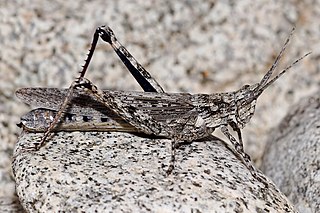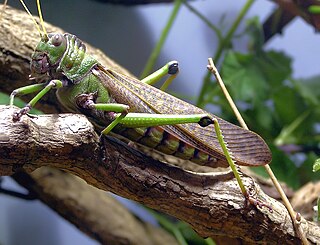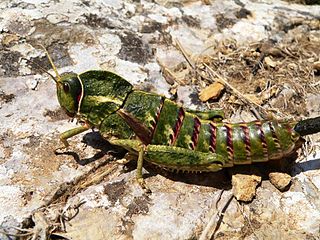
The Acrididae are the predominant family of grasshoppers, comprising some 10,000 of the 11,000 species of the entire suborder Caelifera. The Acrididae are best known because all locusts are of the Acrididae. The subfamily Oedipodinae is sometimes classified as a distinct family Oedipodidae in the superfamily Acridoidea. Acrididae grasshoppers are characterized by relatively short and stout antennae, and tympana on the side of the first abdominal segment.

The Melanoplinae are a subfamily of grasshoppers in the family Acrididae. They are distributed across the Holarctic and Neotropical realms. They are one of the two largest subfamilies in the Acrididae. As of 2001 the Melanoplinae contained over 800 species in over 100 genera, with more species being described continuously.

The Caelifera are a suborder of orthopteran insects. They include the grasshoppers and grasshopper-like insects, as well as other superfamilies classified with them: the ground-hoppers (Tetrigoidea) and pygmy mole crickets (Tridactyloidea). The latter should not be confused with the mole crickets (Gryllotalpidae), which belong to the other Orthopteran sub-order Ensifera.

The Romaleidae or lubber grasshoppers are a family of grasshoppers, based on the type genus Romalea. The species in this family can be found in the Americas.

Eumastacidae are a family of grasshoppers sometimes known as monkey- or matchstick grasshoppers. They usually have thin legs that are held folded at right angles to the body, sometimes close to the horizontal plane. Many species are wingless and the head is at an angle with the top of the head often jutting above the line of the thorax and abdomen. They have three segmented tarsi and have a short antenna with a knobby organ at the tip. They do not have a prosternal spine or tympanum. Most species are tropical and the diversity is greater in the Old World. They are considered primitive within the Orthoptera and feed on algae, ferns and gymnosperms, the more ancient plant groups.

Eumastacoidea is a superfamily within the order Orthoptera, suborder Caelifera. The family has a mainly tropical distribution and have sometimes been called "monkey grasshoppers".

Chorotypidae is a family of tropical Asian grasshoppers, formerly included within the family Eumastacidae. These grasshoppers have a head that rises above the level of the thorax and short antennae. Some species have reduced wings, others have wings that widen towards the tips and still others have a flattened leaf-like shape. They lack abdominal tympani.

The Thericleidae are a family of grasshoppers within the order Orthoptera and superfamily Eumastacoidea. They have exceptionally stubby antennae even for the Caelifera, with most species have a characteristic "horse-headed" look in profile.

Megacheilacris is a genus of grasshopper, in the tribe Taeniophorini, found in Central and South America.
Pyrgacris is a small genus of grasshoppers in the monotypic family Pyrgacrididae. The two species in the genus Pyrgacris are found only on Reunion Island.

Romaleinae is a subfamily of lubber grasshoppers in the family Romaleidae, found in North and South America. There are more than 60 genera and 260 described species in Romaleinae.

The Orthacridinae are a sub-family of grasshoppers in the family Pyrgomorphidae. Species are found in: Central America, Africa, Asia, Australia and certain Pacific Islands. The type genus is Orthacris and the taxon proposed by Bolívar in 1905.

Copiocerinae is a subfamily of short-horned grasshoppers in the family Acrididae. There are at least 20 genera in Copiocerinae, found in southern North America, Central America, and South America.

The Erianthinae are a subfamily of Asian grasshoppers in the family Chorotypidae and based on the type genus Erianthus. There are currently 12 genera and more than 40 described species recorded from southern China, Japan, Indo-China and Malesia.

Acinipe is a genus of grasshoppers in the family Pamphagidae. There are more than 20 described species in Acinipe, found in Southern Europe and North Africa.

Pamphagus is a genus of grasshoppers in the family Pamphagidae. There are about 12 described species in Pamphagus, found in southern Europe and northern Africa.

Paracinipe is a genus of grasshoppers in the family Pamphagidae. There are about 18 described species in Paracinipe, found in northern Africa and the Middle East.

Proctolabinae is a subfamily of grasshoppers in the family Acrididae. There are more than 20 genera and 210 described species which are found in South America.

Stenopola is a genus of spur-throat toothpick grasshoppers in the family Acrididae. There are about 13 described species in Stenopola, found in the Americas.


















